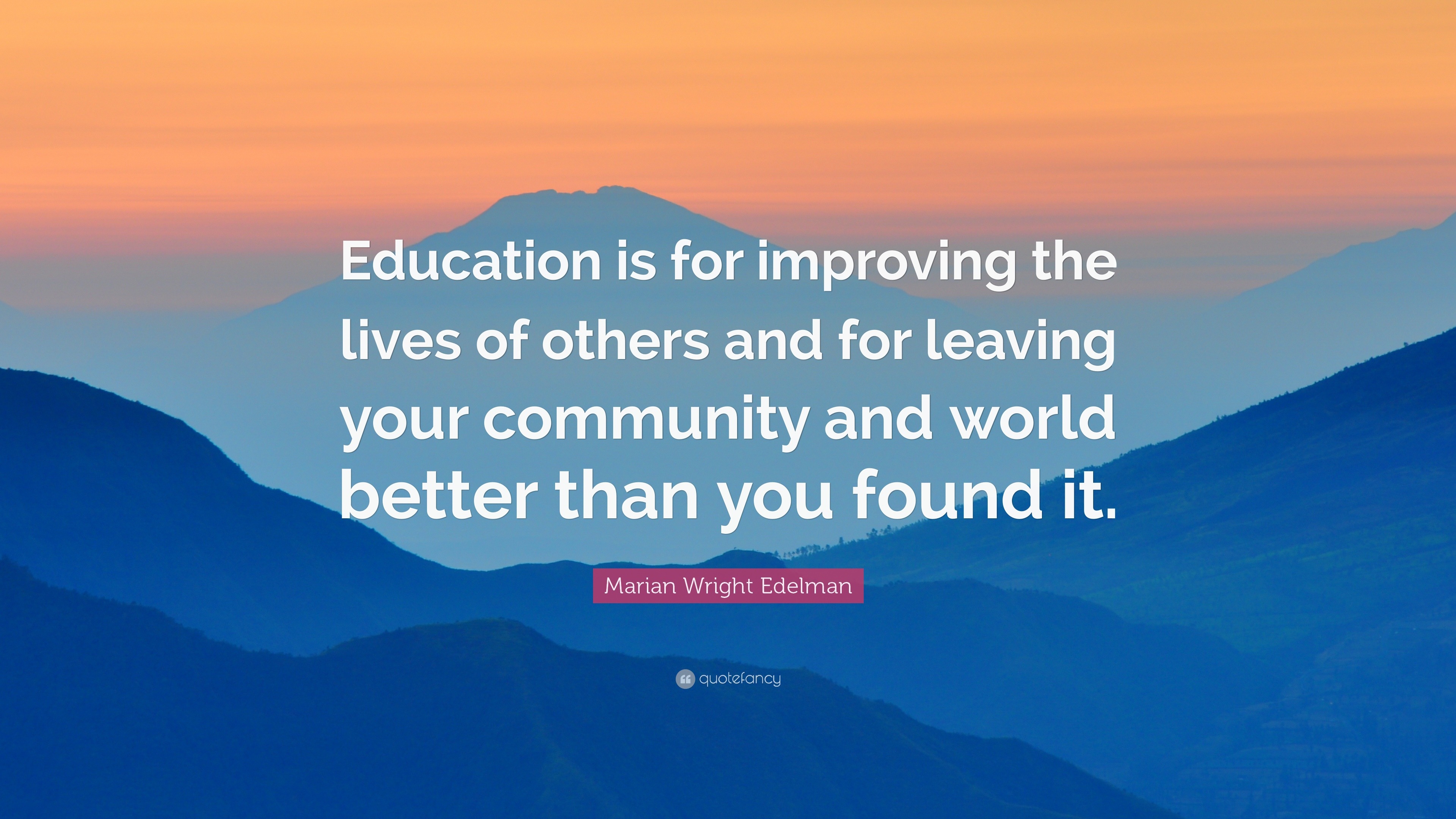Educate in a sentence, we embark on an enlightening odyssey, where the power of knowledge unfolds, shaping minds and destinies.
Throughout history, education has evolved as a beacon of progress, illuminating pathways to personal growth, societal advancement, and economic prosperity.
Contextualize the Meaning of ‘Educate’
The term ‘educate’ carries a multifaceted meaning that has evolved over time. At its core, ‘educate’ refers to the process of imparting knowledge, skills, and values to an individual. This process can take various forms, ranging from formal schooling to informal learning experiences.
Historical Evolution of the Term ‘Educate’
The word ‘educate’ traces its roots back to the Latin word ‘educare’, which means “to lead out”. This etymology reflects the historical understanding of education as a process of guiding individuals toward intellectual and moral development. Over time, the meaning of ‘educate’ has broadened to encompass not only the transmission of knowledge but also the cultivation of critical thinking, problem-solving abilities, and a lifelong love of learning.
Diverse Applications of ‘Educate’
The term ‘educate’ finds application in a wide range of contexts, each with its unique nuances. In formal settings such as schools and universities, ‘educate’ refers to the structured and systematic transmission of knowledge and skills within a particular discipline.
In informal settings, such as community workshops or online courses, ‘educate’ may involve the sharing of knowledge and experiences on a more ad hoc basis.
Examples of sentences that illustrate the diverse applications of ‘educate’:
- “The teacher educated the students on the principles of physics.”
- “The museum exhibit educated visitors about the history of the city.”
- “The mentor educated the apprentice in the art of woodworking.”
- “The travel experience educated the traveler about different cultures.”
- “The self-help book educated the reader on strategies for personal growth.”
The Scope and Impact of Education
Education, in its comprehensive scope, encompasses a multifaceted landscape of learning experiences that extend from the formative years of primary education through the specialized pursuits of tertiary education. It plays a pivotal role in shaping individuals, empowering them with knowledge, skills, and values that contribute to their personal growth, career advancement, and the overall progress of society.
Levels and Types of Education
The educational landscape is structured into distinct levels, each tailored to specific developmental stages and learning objectives. Primary education, often referred to as elementary school, provides a foundational framework of literacy, numeracy, and basic concepts. Secondary education, encompassing middle and high school, expands upon this foundation, introducing students to a broader range of subjects and preparing them for higher education or the workforce.
Tertiary education, including colleges and universities, offers advanced academic programs leading to bachelor’s, master’s, and doctoral degrees. This level of education fosters specialized knowledge and research skills, preparing individuals for careers in academia, research, and various professions.
Education’s Role in Personal Development
Education serves as a catalyst for personal development, nurturing intellectual curiosity, critical thinking, and problem-solving abilities. It empowers individuals with the tools to navigate an ever-changing world, adapt to new challenges, and make informed decisions. Moreover, education fosters a sense of self-awareness and self-confidence, enabling individuals to reach their full potential and live fulfilling lives.
Education’s Role in Career Advancement
In today’s competitive job market, education has become an indispensable factor for career advancement. Employers increasingly seek individuals with specialized knowledge, skills, and credentials. Higher levels of education open doors to a wider range of career opportunities, increased earning potential, and leadership positions.
Education’s Role in Societal Progress
Education is the cornerstone of societal progress. It fosters informed citizenship, promotes social cohesion, and cultivates a culture of innovation and creativity. An educated population is better equipped to address complex social issues, contribute to economic growth, and create a more just and equitable society.
Statistics and Research Findings
Numerous studies have demonstrated the profound impact of education on economic growth and social well-being. The World Bank estimates that every additional year of schooling can increase an individual’s earning potential by 10-15%. Education also reduces poverty, improves health outcomes, and promotes gender equality.
Research has shown that countries with higher levels of educational attainment experience higher economic growth rates, reduced crime rates, and improved overall quality of life. Education empowers individuals to make positive contributions to society, fostering a more prosperous and harmonious world.
Methods and Approaches to Education: Educate In A Sentence
Education has evolved significantly over time, and with it, the methods and approaches used to impart knowledge and skills. From traditional teacher-centered models to contemporary student-centered approaches, each methodology has its advantages and disadvantages. This section explores various educational approaches, comparing their strengths and weaknesses, and showcasing innovative practices that enhance student engagement and learning outcomes.
Traditional Teaching Methodologies
Traditional teaching methodologies, such as lecture-based instruction, have been widely used for centuries. In this approach, the teacher is the primary source of information, delivering content through lectures, presentations, and textbooks. While traditional methods can be effective in conveying a large amount of information in a structured manner, they often lack interactivity and may not cater to diverse learning styles.
Contemporary Teaching Methodologies
Contemporary teaching methodologies, such as student-centered learning and blended learning, have gained prominence in recent years. These approaches prioritize student engagement, active participation, and personalized learning experiences. Student-centered learning empowers students to take ownership of their learning process, while blended learning combines traditional face-to-face instruction with online learning platforms and resources.
Innovative Educational Practices, Educate in a sentence
Innovative educational practices are constantly emerging, leveraging technology and creative strategies to enhance student engagement and learning outcomes. Examples include gamification, where game-like elements are incorporated into learning activities, and project-based learning, where students work on real-world projects to apply their knowledge and skills.
Advantages and Disadvantages of Different Educational Approaches
The choice of educational approach depends on various factors, including the subject matter, student demographics, and learning objectives. Each approach has its advantages and disadvantages:
- Lecture-based learning:Advantages include efficient delivery of content, clarity of presentation, and structured learning. Disadvantages include limited student engagement, potential passivity, and lack of interactivity.
- Student-centered learning:Advantages include active student participation, personalized learning experiences, and improved critical thinking skills. Disadvantages include increased preparation time for teachers, potential for off-task behavior, and difficulty in managing large classes.
- Blended learning:Advantages include flexibility, adaptability to diverse learning styles, and access to a wider range of learning resources. Disadvantages include potential technical challenges, digital equity issues, and the need for effective time management.
Conclusion
The choice of educational methods and approaches should be informed by a deep understanding of the subject matter, student needs, and learning objectives. By carefully considering the advantages and disadvantages of different methodologies, educators can create effective and engaging learning environments that empower students to succeed.
The Role of Technology in Education
Technology has revolutionized education, transforming the way knowledge is delivered and accessed. From online learning platforms to virtual reality simulations, technology has expanded educational opportunities and enhanced learning experiences.
Online Learning Platforms
Online learning platforms, such as Coursera, edX, and Udemy, have democratized education by providing access to courses and programs from top universities and institutions worldwide. These platforms offer a flexible and convenient way to learn, enabling students to study at their own pace and on their own schedule.
- Example: Coursera’s collaboration with Google to offer specialized courses in data science and machine learning has empowered thousands of learners to upskill in these high-demand fields.
Virtual Reality Simulations
Virtual reality (VR) simulations immerse students in interactive learning environments, allowing them to experience complex concepts and scenarios firsthand. VR simulations are particularly effective in STEM fields, such as medicine, engineering, and architecture.
- Example: The University of California, Berkeley, uses VR simulations to train medical students in surgical procedures, providing them with a safe and realistic environment to practice their skills.
Artificial Intelligence
Artificial intelligence (AI) is transforming education by providing personalized learning experiences, automating administrative tasks, and offering real-time feedback. AI-powered chatbots can answer student questions 24/7, while adaptive learning platforms tailor content to each student’s needs.
- Example: Duolingo, a language learning app, uses AI to create personalized learning plans for each user, adapting to their learning style and progress.
Challenges and Opportunities in Education
Education systems worldwide face significant challenges, including inequality, inadequate funding, and teacher shortages. To address these challenges, innovative solutions and policy recommendations are necessary. Additionally, emerging trends like lifelong learning and personalized learning pathways present opportunities to enhance education.
Key Challenges in Education
- Inequality:Disparities in access to quality education persist, with marginalized communities often facing barriers to educational attainment.
- Funding:Inadequate funding for education systems can limit access to resources, infrastructure, and qualified teachers.
- Teacher Shortages:Many countries face a shortage of qualified teachers, particularly in underserved areas.
Innovative Solutions and Policy Recommendations
Addressing these challenges requires innovative solutions and policy recommendations, such as:
- Targeted Funding:Allocating resources to disadvantaged communities and underfunded schools to ensure equitable access to quality education.
- Teacher Training and Support:Investing in teacher training programs and providing ongoing support to improve teacher quality and retention.
- Technology Integration:Leveraging technology to enhance learning experiences, personalize instruction, and address teacher shortages in remote areas.
Emerging Trends and Opportunities in Education
Education is also witnessing emerging trends and opportunities, including:
- Lifelong Learning:The concept of continuous learning beyond traditional schooling is gaining traction, with individuals seeking knowledge and skills throughout their lives.
- Personalized Learning Pathways:Education systems are becoming more flexible and adaptable, allowing learners to tailor their education to their individual needs and interests.
Final Thoughts
As we navigate the ever-changing educational landscape, let us embrace innovation and collaboration to create equitable and transformative learning experiences for all. For in the pursuit of knowledge, we sow the seeds of a brighter future.
Expert Answers
What is the essence of education?
Education is the process of acquiring knowledge, skills, values, beliefs, and habits that enable individuals to develop their full potential and contribute meaningfully to society.
How does education impact personal growth?
Education empowers individuals with the tools and confidence to navigate life’s challenges, make informed decisions, and pursue their passions.
What are the benefits of education for society?
Education fosters social cohesion, economic growth, and cultural advancement by equipping individuals with the skills and knowledge necessary to address societal issues and contribute to the common good.


